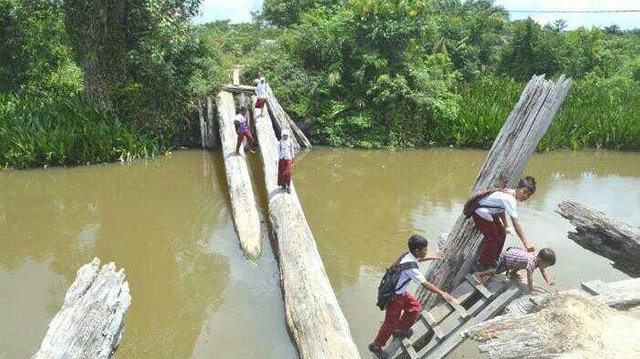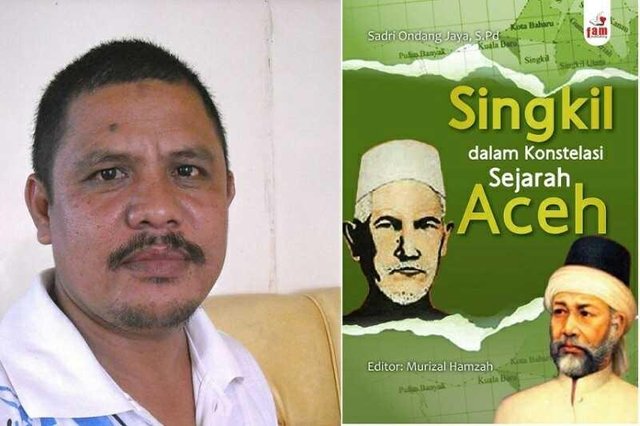Welcome to Aceh
ACEH SINGKIL in recent days, after two mass groups have been the focus of attention from various parts of the world. All is directed to this country, the land of Hamzah Fansuri, a Sufi scholar and poet who lived in the 16th century.

How did Singkil's history begin? a book entitled The History of "Singkil in the Constellation of the History of Aceh" written by Sadri Ondang Jaya explores the origins of this district which are said to have existed since the time of Prophet Sulayman a.
As written in a book published by the Indonesian Writing Forum (FAM), among the Aceh Singkil masyarat, the story goes that Singkil has existed since the time of Prophet Sulayman.
Location Singkil is allegedly located in the area between the Wave and Kuala Kepang, Sultan Daulat, now included in the territory of the Government of Sibulussalam. (Read: Sadri Ondang Writing Book of Singkil History)
Due to the occurrence of various natural events, Kuala Kepang and Waves, now its position has been in the upper reaches of the Singkil River. Is this story a joke or a fact? And to what extent the truth, it seems difficult to prove. Since there are no authentic references and historical sites on this subject, only word-of-mouths are circulating around the community.
There is also a historical passage which says that Singkil existed in the Middle Stone Age (Mesolitikum) or at least since the new stone age (neolithic + 5000-2000 BC).
But clearly, based on prove history, the old Singkil, is not the current Singkil. The old singkil, long gone, drowned, washed away waves. Nun, deep in the middle of the ocean.
Geographically, the old Singkil, located in the western direction of Singkil City now. Fishermen often call it with Ujung Sigambung or Berok.
 
The city of Singkil, first built by Singkil monarchs, dates from the mid-7th century to the 19th century. In this first city of Singkil, there is a very famous and busiest airport on the West coast of Aceh.
This port is busy visiting foreign ships from Asia, Africa, Middle East, Europe, and America. Also do not miss the ships from Tiku, Pariman, and ships from the eastern part of Indonesia.
In this Singkil City also, has been available a variety of facilities are quite complete. Such as, markets, controleur houses, pendapa, financial offices, duane offices and ports, as well as hospitals. Of course there are also, the king's palace and residential residents.
Residents of Singkil City at that time, only amounted to 2,104 people. It consists of 6 Europeans, 55 Chinese, 183 Arabs and the rest of the population from various ethnic and ethnic groups (Fajri Alihar, 20002: p. 27). There are pepper gardens, patchouli, and other export commodity crops.
Malang can not be rejected, lucky can not be achieved, on February 12, 1861 Singkil City was rocked by a tectonic earthquake that was terrible and also coupled with marine geloro or known today as the tsunami. (E.B. Kielstra, 1892). The city of Singkil was crushed and drowned by sweeping waves, which remained only the ruins of the building.
The events of this earthquake and tsunami were cited by Moehammad Saleh in his outobiography book, Riwajat Hidoep and Perasaian Saja, written in 1965. In the book Saleh said that, until the mid-19th century, Singkil was still one of the largest trading centers in Aceh.
Around the beginning of 1861, Saleh sailed to Singkil to trade. In conducting his trading activities, Saleh stay a few days in Singkil, in an inn not far from the port.
After the trade deal is complete, then Saleh sailed back to Pariaman. "Not long ago I was in Pariaman, returning from Singkil, it broke the news that the Singkil market was immersed by a geloro (rising seawater or some kind of tsunami) accompanied by an earthquake," Saleh wrote.
The earthquake and geloro called Saleh, have drowned Coral Gosong Jawijawi located near Singkil. "It's not just the dubious Singkil Market, the coconut plantation, the pepper garden, the cemetery was swept away by the flood. Many people fled, fleeing to the southern part of Singkil, "said the pious.